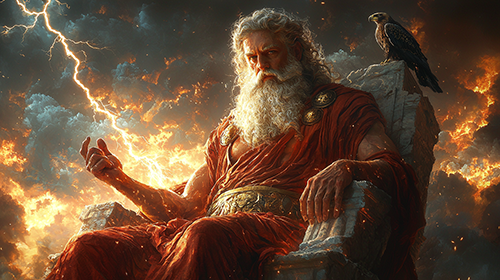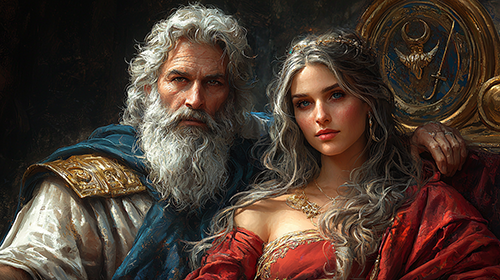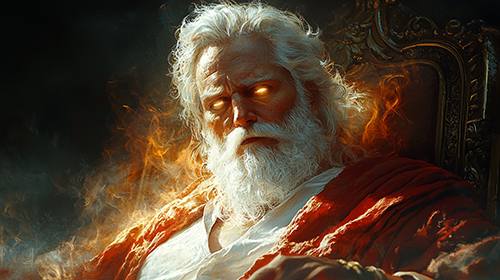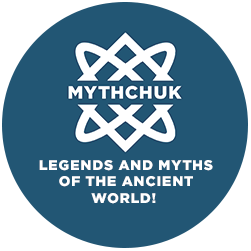Zeus: God of Thunder, Fate, and Kingship in Greek Mythology
- Main
- >
- Greek Mythology
- >
- Greek Pantheons of the Gods
- >
- Zeus
Zeus always feared one prophecy. And it haunted him—even at the height of his power…
Zeus is the supreme god of the ancient Greek pantheon, son of the Titans Cronus and Rhea. His thunderbolt struck fear into both gods and mortals. He overthrew the Titans, defeated the monstrous Typhon, established cosmic order, and became the judge, king of the skies, and guarantor of justice. His role is central to all of Greek mythology.
 Zeus
ZeusBirth and Rescue
According to Hesiod’s Theogony, the Titan Cronus swallowed his children to avoid a prophecy that one would overthrow him. Rhea, his wife, decided to save their youngest—Zeus. She secretly gave birth to him on the island of Crete and gave Cronus a swaddled stone instead. The infant Zeus was raised in a cave on Mount Dicte (or Ida), protected by the Curetes, warriors who clashed their shields to drown out his cries.
Even before realizing his destiny, Zeus was already altering the course of history.
 the Titan Cronus
the Titan CronusRebellion Against the Titans
As he matured, Zeus—assisted by Metis, the goddess of wisdom—forced Cronus to vomit up his siblings: Hera, Demeter, Hestia, Hades, and Poseidon. Thus began the Titanomachy—a ten-year war between the Olympians and the Titans.
To shift the balance, Zeus freed the Hecatoncheires and Cyclopes from Tartarus. The Cyclopes gifted him his signature weapon: the thunderbolt. With this weapon and the unity of the Olympians, Zeus defeated the Titans. Cronus was overthrown, the Titans imprisoned in Tartarus, and Zeus claimed the highest authority.
 Zeus’s Thunderbolts (Keraunoi)
Zeus’s Thunderbolts (Keraunoi)The Post-War Order
After victory, Zeus, Poseidon, and Hades divided the cosmos: Zeus took the sky, Poseidon the sea, and Hades the underworld. The Earth and Mount Olympus remained common ground.
This division wasn’t just a family arrangement—it was a mythological explanation for natural and divine order. Zeus became not only the most powerful, but the most responsible: the divine judge, protector of oaths, travelers, truth, and justice.
 Zeus is the ruler of the sky
Zeus is the ruler of the skyBattle with Typhon
Following the Titans, a new threat arose—Typhon, born of Gaia, whose body sprouted serpents, eyes shot fire, and voice echoed with a hundred sounds. In Theogony, Hesiod describes Typhon as so terrifying that even the Olympians briefly fled to Egypt.
But Zeus stood his ground. After a long battle, he defeated Typhon with his thunderbolts and cast him beneath Mount Etna. This victory symbolized not just physical might, but Zeus's cosmic authority over chaos.
 Typhon
TyphonLove, Marriage, and Divine Offspring
Zeus had numerous affairs—with both goddesses and mortal women—each with mythic importance:
- Metis: goddess of wisdom, Zeus’s first wife, tied to the prophecy we’ll discuss below.
- Hera: his sister and wife, goddess of marriage—an official but stormy union.
- Mnemosyne: mother of the nine Muses.
- Leto: mother of Apollo and Artemis.
- Semele: mother of Dionysus.
- Alcmene: mother of Heracles.
- Europa, Io, and Danaë: mortal women who birthed royal dynasties.
These offspring became gods or heroes—bearers of divine order, patrons of arts, or guardians of values. Through them, Zeus “sowed” divine legacy across the world.
 Love, Marriage, and Divine Offspring
Love, Marriage, and Divine OffspringThe Prophecy of Zeus’s Fall: A Fear That Lingered
Despite his supreme power, Zeus was not beyond fear. According to Hesiod, a prophecy concerned Metis, Zeus’s first wife: she would bear a son more powerful than his father, destined to overthrow him.
To prevent this, Zeus swallowed Metis while she was pregnant. But life had already begun. Eventually, Athena sprang from Zeus’s head—fully armed and shouting with strength. She became not a rival, but an ally.
Thus, Zeus disrupted the natural order—avoiding a fatal destiny. Yet the fact that even the king of gods feared fate reveals a core truth: above all stands Ananke—the force of inevitability.
 Metis, Zeus’s first wife
Metis, Zeus’s first wifeZeus as Guardian of Law
In Homer’s Iliad, Zeus sits atop Olympus, determining the fates of warriors and kings. His will is supreme. He doesn’t always intervene—but when he does, it changes everything. He was known as:
- Zeus Xenios — protector of travelers and hospitality
- Zeus Horkios — guardian of oaths
- Zeus Hikesios — protector of refugees
His justice wasn’t blind, but strict. He punished violators of divine law, yet always allowed for repentance.
 Zeus as Guardian of Law
Zeus as Guardian of LawZeus’s Cult in the Ancient World
Worshipped throughout Greece, Zeus had prominent sanctuaries:
- Olympia — home to his principal shrine, where a gold-and-ivory statue by Phidias, one of the Seven Wonders of the Ancient World, stood.
- Dodona — the oldest oracle, where priests interpreted his will through the rustling of sacred oaks.
Sports games, sacrifices, oaths, and treaties—all were made under Zeus’s watch. He embodied law and cosmic balance.
 Zeus
ZeusZeus and Philosophy: Power Without Tyranny
In Plato, Zeus is the model of a wise ruler. For Stoics, he symbolizes Logos—divine reason permeating the cosmos. In Orphic texts, he is both the final and the first god, who absorbs all and begins anew.
In late antiquity, Zeus evolves from a "bearded thunderer" into a symbol of universal order, natural law, and cosmic harmony.
Zeus is not merely the god of thunder. He is the pinnacle of the mythological hierarchy—a symbol of justice, wisdom, power, and kingship. His symbols: thunderbolt, scepter, eagle, throne, and oak. His children: gods, heroes, kings. He does not die, for he represents eternity. But even he is not beyond fate—for the Moirai, the Fates, stand above all.
Today, Zeus lives on—in philosophy, iconography, art, and architecture. He remains an archetype: one who rules, yet is bound; who punishes, but with justice.
